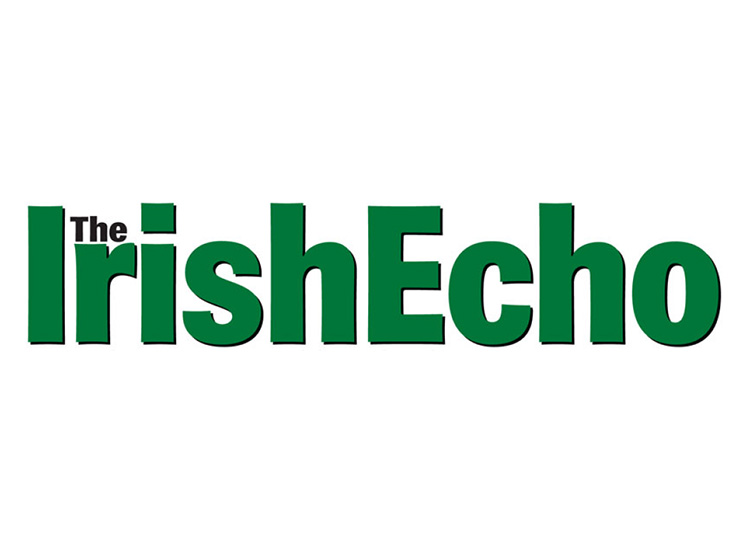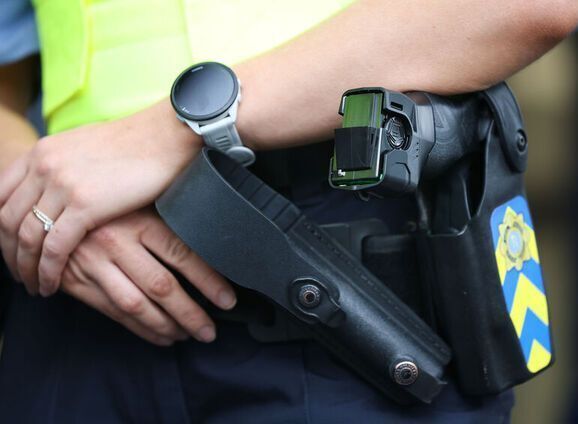EU Chief Negotiator on Brexit, Michel Barnier, (second from left) is pictured visiting Lough Egish Food Park on the border between County Monaghan and Count Armagh. Also in the picture are Irish Foreign Affairs Minister Charlie Flanagan, the Minister for Arts, Heritage, Regional, Rural and Gaeltacht Affairs Heather Humphreys, Phil Hogan, the EU’s Commissioner for Agriculture and Rural Development, and Michael Sheridan of Co-Operation Ireland (far left). RollingNews.ie photo.
By Evan Short and Ray O’Hanlon
One of the consequences of the upcoming Brexit negotiations could be the border being used as a bargaining chip, even a kind of hostage, this as the British government attempts to strike a trade deal with the European Union - this as it exits the bloc.
Contrary to an EU desire to resolve the Irish border issue in the first stage of talks between the EU and the UK, the British government’s Brexit Secretary, David Davis, has said that it is “wholly illogical” to think that the border issue can be separated from a trade deal.
“How on earth do you resolve the issue of the border unless you know what the customs agreement is, what the free trade agreement is, whether you need to change tariffs at the border?”
Mr. Davis’s remarks have sparked alarm in Ireland even as the EU’s chief Brexit negotiator Michel Barnier arrived in Ireland for talks with Taoiseach Enda Kenny and other Irish political leaders.
One of those leaders, and one who could soon succeed Enda Kenny as Fine Gael leader and taoiseach - Minister for Social Protection, Leo Varadkar, has argued that Northern Ireland should be allowed to remain in the single market and the customs union following Brexit.
He has further argued against any physical land border being enforced between the North and Republic.
If such an outcome was agreed to quickly by all sides, Mr. Davis and the British government would seemingly lose a Brexit bargaining chip, this based on the remarks by Minister Davis.
Sinn Féin President Gerry Adams has warned that the remarks by Mr. Davis are a direct challenge to the Irish government and to the negotiating stance that was outlined by Mr. Barnier when he visited Dublin.
“The British minister responsible for Brexit, David Davis, asserted that Britain will not accept any rulings by the European Court of Justice.
“He also dismissed the Irish government and EU Council’s negotiating sequence as laid out recently in the Brexit guidelines and by Michel Barnier last week in the Oireachtas,” said Adams.
And he continued: “Mr. Davis made it clear that he does not accept that the first items to be resolved are the border and the divorce bill for Britain.
“Very specifically, he was disparaging toward any suggestion that a deal on the border could be agreed before the issue of the single market, the customs union, and a future free trade deal between the EU and Britain was agreed.
“These remarks emphasis the need for the Irish government to urgently press the European Council to secure for the North special designated status within the EU.
“Without that protection, the effect of Brexit on the North’s economy and, in particular, our agricultural and agri-food sectors will be enormous. The Border region will be especially hard hit and the fundamental human rights guarantees of the Good Friday Agreement will be significantly undermined.
“The Irish government is a co-equal guarantor of the Good Friday Agreement. It must fulfil its responsibility to defend the agreement and to defend the decision of the people of the North in the referendum last year to remain within the EU.”
Mr. Barnier, who will be heading up the European Union's talks team in their negotiations with Britain spoke to both houses of the Oireachtas in the Dáil last week, and also visited the border region during a two day visit.
Speaking in the Dáil, Barnier said the UK’s departure from the EU “would have consequences” and added that the Irish border would be one of his three priorities in negotiations with Britain.
However, he did alarm Irish politicians by adding that customs controls were part of EU border management.
The EU wants to see a conclusion to the Brexit negotiations before it discusses any new trade arrangements with the UK.
London wants the two issues to be hammers out simultaneously.
It would not seem that London is ready to use the border as leverage in this standoff between the UK and Brussels.
Separately, and speaking during a visit to Ireland where he addressed a meeting in County Wicklow of the European People’s Party – the largest group in the European Parliament of which Fine Gael are members – former British Prime Minister Tony Blair, who was a key architect of the Good Friday Agreement, said he believed there was a “common desire” to treat Northern Ireland as a “special case.”
“At the moment we have a common travel area where people can travel freely between south and north… on the island of Ireland. This is vital to maintain.”
Blair added: “I think whatever disagreements I have with the British government over Brexit more generally, I think there is a real consensus across the British political system that we must do everything we possibly can to keep the present situation between the Republic of Ireland and Northern Ireland… as similar to what we have at the moment as we possibly can.”








